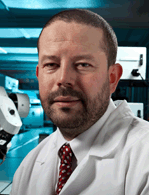08:00 | Registration |
09:00 |  | Keynote Presentation High Content Cell Based Assays in Drug Discovery: Changing the HTS Paradigm
Hakim Djaballah, CEO, Institute Pasteur - Korea, Korea South
HCS has evolved over the course of nearly two decades, enabling us to perform highly complex cellular based HCA screens, sometimes involving primary and human embryonic stem cells. With this development and acceptance as a screening platform, came data explosion requiring special logistics typically not associated with screening operations. |
|
|
High-Content Analysis Assays |
| |
10:00 | High-Content Time-Lapse Assays of Proliferation and Cell Survival
Peter Antinozzi, Assistant Professor, Wake Forest University School of Medicine, United States of America
We will present methods which combine automated time-lapse microscopy with robust image analysis algorithms to simultaneously assess cell proliferation, survival, and motility. Examples will include a compound screen for beta-cell regeneration targets and a genetic screen of allelic variants involved in kidney disease. |
10:30 | Coffee Break & Networking in Exhibition Hall |
11:15 | Cell-Based Assays for the Discovery of Inhibitors of Viral Proteome Processing
Roland Wolkowicz, Associate Professor, San Diego State University, United States of America
We have developed a T-cell based assay that monitors the activity of HIV-1 protease, where inhibition of protease leads to the activation of GFP. The assay is further developed in a multiplexed format for high throughput screening. |
|
Screening and Imaging | Session Sponsors |
| |
11:45 | The Implementation of Micro-Plate Bioreactors and 3D Assay Systems for Enhancing the Relevance and Reproducibility of Cell Based Assays for Image Based Screening.
Anthony Mitchell Davies, Director, Trinity College Dublin, Ireland
We have developed a new suite of micro-plate and 3D assay technologies that offer demonstrable improvements in both experimental reproducibility and physiological relevance. In this presentation we will examine the key advantages of these technologies when used in cell based screening workflows. |
12:15 | Technology Spotlight |
12:30 | Lunch and Networking in Exhibition Hall |
13:30 | Poster Viewing Session |
14:15 | 3D Chemical Compounds Screening Assay to Uncover Signalling Pathways Involved in CAFs-remodeling Tumor Microenvironment.
Cedric Gaggioli, Baby Team Leader, Université Nice Sophia Antipolis, France
Carcinoma Associated Fibroblasts (CAFs) can lead collective carcinoma cells invasion by extracellular matrix remodeling and tracks formation through actomyosin-dependent force generation. Using chemical compounds screening assay based on 3D matrix remodeling by CAFs, we identified Janus Kinase (JAK) signaling pathway as a regulator of actomyosin contractility and matrix remodeling by stroma cells. |
14:45 | Characterization of Cell-Based Assays for use with 3D Culture Models to Determine the Mechanism of Cytotoxicity
Jeffrey Kelly, Researcher, Promega, United States of America
A variety of 3-dimensional cell culture approaches are emerging as candidates to represent more physiologically relevant models for in vitro toxicity testing. Although many convenient add-mix-measure cell-based assay protocols exist to interrogate markers of cytotoxicity, most protocols were designed for use on cells grown as monolayers or as a suspension cultures. There is a need to verify the validity of metabolic indicators used as markers of cell health as well as the performance of standard assays with increasingly complex 3D model systems. |
15:15 | Coffee Break & Networking in Exhibition Hall |
16:00 | Computational Imaging for Telemedicine and High-throughput Analysis
Aydogan Ozcan, Chancellor's Professor, University of California-Los Angeles; Associate Director, California NanoSystems Institute (CNSI), United States of America
We explore our recent progress on computational microscopy for telemedicine and wide-field imaging applications. |
16:30 | Unconventional Luciferase- and Image-based Assays in Phenotypic Screening
Robin Ketteler, Group Leader/Manager, University College London, United Kingdom
Phenotypic Screening is a powerful tool to identify mechanisms of actions of small molecule compounds. Here, I will present novel high-throughput screening methods using luciferases and fluorescent proteins to identify chemicals that modulate autophagy and mitogenic signal transduction. |
17:00 | End of Day One |



